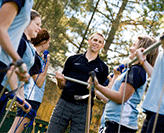School-based solution helps inactive teens
School-based intervention programs may offer hope for inactive teenage girls, a University of Newcastle study has found.
 The first of its kind in Australia, the program achieved reductions in
soft-drink intake, screen-time and body fat amongst its target group of adolescent
girls from low-income communities.
The first of its kind in Australia, the program achieved reductions in
soft-drink intake, screen-time and body fat amongst its target group of adolescent
girls from low-income communities.
"Childhood obesity has more than doubled over the past ten years, with roughly one in four children aged 5-17 years overweight or obese. Key behaviours such as physical activity, sedentary activities, and dietary habits contribute to unhealthy weight gain," said lead researcher, Associate Professor David Lubans.
"Such behaviours deteriorate during adolescence, especially among adolescent girls. The study focused on schools in low-income areas due to the low rates of physical activity and high prevalence of obesity in these communities."
Forty-three per cent of the study's sample were overweight or obese. This represents almost double the national average (23 per cent) found in the Australian National Children's Nutrition and Physical Activity Survey.
"Preventing unhealthy weight gain during adolescence is important and health behaviours established during this time are often maintained into adulthood."
Involving 357 adolescent girls in 12 secondary schools across NSW, the 12-month program combined physical activity sessions, nutrition workshops and behaviour change strategies such as goal setting and self-monitoring. The majority of the program's intervention took place during timetabled school sport and the lunch time and included lifetime physical activities such as resistance training, skipping, boxing and Zumba.
When participants were surveyed again twelve months after completion of the program, body fat levels were found to be 2 per cent lower among girls in the intervention group.
"Our findings suggest that a multi-component school-based program can help prevent unhealthy weight gain in adolescent girls over a two year period."
Contact
- Sheena Martin, Media and Public Relations
- Phone: +61 2 48218714.
Related news
- Shanae’s passion for caring delivers her dream to work in health
- Food and nutrition degree serves Keren a rewarding career
- Kicking goals on and off the field, Joeli proves you can do it all
- Proving age is just a number, Arlyn wants to inspire more women in their 50s to pursue education
- Sky’s the limit for graduates on the Central Coast
The University of Newcastle acknowledges the traditional custodians of the lands within our footprint areas: Awabakal, Darkinjung, Biripai, Worimi, Wonnarua, and Eora Nations. We also pay respect to the wisdom of our Elders past and present.